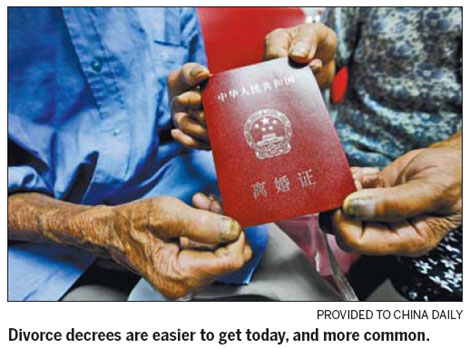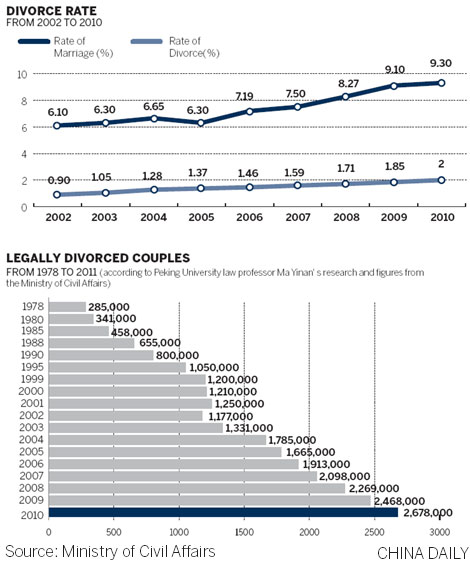D.i.v.o.r.c.e.
Updated: 2011-11-13 06:57
By Han Bingbin(China Daily)
|
|||||||||


There are many social indicators to a country's development. Unfortunately, one of those signs seems to be a rising number of broken marriages. In China - now the world's most populous country and its second-strongest economy - Han Bingbin looks at the heartbreak, and searches for the reasons why.
It was Valentine's Day. Wang Xiaobo (a pseudonym) had been in line since early morning to register her marriage. In front of her, couples were carefully threading their way into a little room and filing out from the other side. It made her think: "It's exactly like an assembly line." The process was so quick and simple that many couples came out slightly bewildered and wondering: "Are we married already?" For Wang, her feelings were slightly more complex. This was her second time in the line. The first time was four years ago, in 2007, a year after she graduated from college. Her husband then was seven years older, a man she considered "mature, considerate and good at cooking" and who gave her "a strong sense of security". She had married him after they dated for two years and unlike her classmates who were still playing the field and shopping for the perfect mate, Wang was content with her choice and expected a "stable and happy" life after marriage.
But the rude awakening came sooner than she expected.
It was not the perfect match she thought it was. They spoke less and less to each other until conversations were reduced to curt greetings when they met at home after work.
Wang also found her husband sexually indifferent and, in their 16-month-long marriage, their sex life was practically non-existent. She tried to find out what was wrong, but he dodged the question every time.
She concluded that the love was gone, and it was around this time that she started an affair. Things deteriorated quickly and, one day, she moved out and asked for a divorce. To her surprise, her husband agreed.
With that, Wang became part of the statistics that show an alarming rise in divorce in China. Figures from the Ministry of Civil Affairs show that in the first three quarters of 2011, 2.8 million couples registered for divorce, up 12 percent year-on-year.
That translates to more than 10,000 families breaking down every day.
In the last five years, the number of divorces has steadily increased by about 7 percent year-on-year, nationwide. In the first-tier cities like Beijing and Shanghai, the rate has reportedly surpassed 30 percent.
Peking University law professor Ma Yinan says the rising trend began as early as the late 1970s, the result of strained marriages that came from differing political perspectives during the "cultural revolution" (1966-76). It is a crisis that has escalated, not abated.
Ma suggests that China's transformation to a market economy and modernization also began to reshape lifestyles and values, including those on marriage. With material comforts vastly improved, people are no longer satisfied with marriages that merely fulfilled the need to carry on the family line.
Especially for women, economic independence has meant power to be emotionally more independent, making them brave enough to walk out of an unsatisfactory union. In Wang's words, there is a new mantra: "Financially, I am independent. I don't need someone to take care of me. I only look for love."
Reports from Xinhua News Agency also suggest that more and more divorce hearings are initiated by women, with figures pointing to more than half the cases, in places as far apart as Beijing and Xinjiang.
Another contributing factor has emboldened suffering wives: Society is becoming more tolerant toward divorce. Public judgment has shifted from "shame" to "personal choice and privacy", according to Qu Yang, psychiatrist and veteran marriage counselor at the Beijing National Olympic Psychological Hospital.
Qu recalls from his own childhood being taught that "good people don't get divorced and divorcees aren't good".
At a time when conservativeness and self-containment were prevalent, society placed great value on collectivism and peer pressure had enormous influence, Qu says, and social scrutiny forced many couples to stay in unhappy marriages.
National policies, which reflected the moral values of that time, also dissuaded people. To get a divorce, the couple had to obtain a written recommendation from their employers as well as go through a one-month cooling-off period.
A decade of change
These processes stayed in place until 2003, when the State Council launched new regulations that canceled these complicated procedures. Couples who agreed to split could get divorced on the spot.
That year, according to Ma's research, 1.3 million couples separated legally, the highest number since 1949.
"While getting divorced still underwent administrative intervention and social pressure, the low rate did not reflect the actual quality of marriages," says Qu. "To some extent, rising divorce rates actually signifies progress of society." Once the bread and butter issues were resolved, people were looking for better emotional well-being.
But it is still not a rosy picture.
A demand for better quality in a marriage and a more tolerant attitude towards divorce may have freed some from unhappy relationships, but a new generation also brings a totally different perspective.
Qu says people born after the 1980s often misunderstand the meaning of marriage. They currently make up the largest numbers of divorces.
In these newly prosperous times, young people are more given to lightning courtships fuelled by intense passion. Once the first flush of romance fades, however, they want out of the relationship instead of working out the problems. Qu says that for these age groups, the danger period is usually the first two years of marriage.
The reason for divorce is usually "incompatible personalities", but Qu says a new individualism has taken a grip on young Chinese. They want what they can get out of a relationship and are less tolerant about what the other party needs or wants.
People more selfish
Qu recalls many cases when one partner chooses to go abroad for study or work, a separation that puts enormous strain on the marriage.
"In a purely traditional culture, it's easier to produce so-called compassionate love," Qu says. "But frankly, people are more selfish these days. There are fewer compromises."
Financial benefit also drives some marriages: If the spouse cannot get what was promised before the knot was tied, such as a house or apartment, the couple may end up in court.
The irony, Qu says, is that husbands who can provide all the material comforts are also the ones rich enough to support extra-marital affairs, still the biggest cause for divorce.
"It's been a growing phenomenon among the newly rich to divorce their wives and marry their lovers," says Yang Xiaolin, a divorce lawyer in Beijing. In fact, many successful men take having a mistress as a status symbol, a fact that dismays both the psychologist and the lawyer.
Qu says the secret to a successful marriage is still the age-old solution: Love, tolerance and compromise. He also advises the young to take their time and choose their life partners carefully.
That's also what Wang believes, after her roller-coaster ride since her first union. She has faith her second marriage will be long and happy, thanks to lessons learned from her first.
"There's no perfect man. Put up with the little shortcomings. And, don't bet on a marriage with love at first sight, or passing passions. Choose patiently. It truly takes a long time to understand a person and to understand yourself," she concludes.
While Wang still cannot pin down the criteria for a good marriage, Qu prefers to fall back on a time-tested adage: Choose a spouse with similar family and financial backgrounds to even the odds and lay common ground for better communication. It makes for a better start and could prevent a possible bitter end.
You can contact the writer at hanbingbin@chinadaily.com.cn.

(China Daily 11/13/2011 page1)